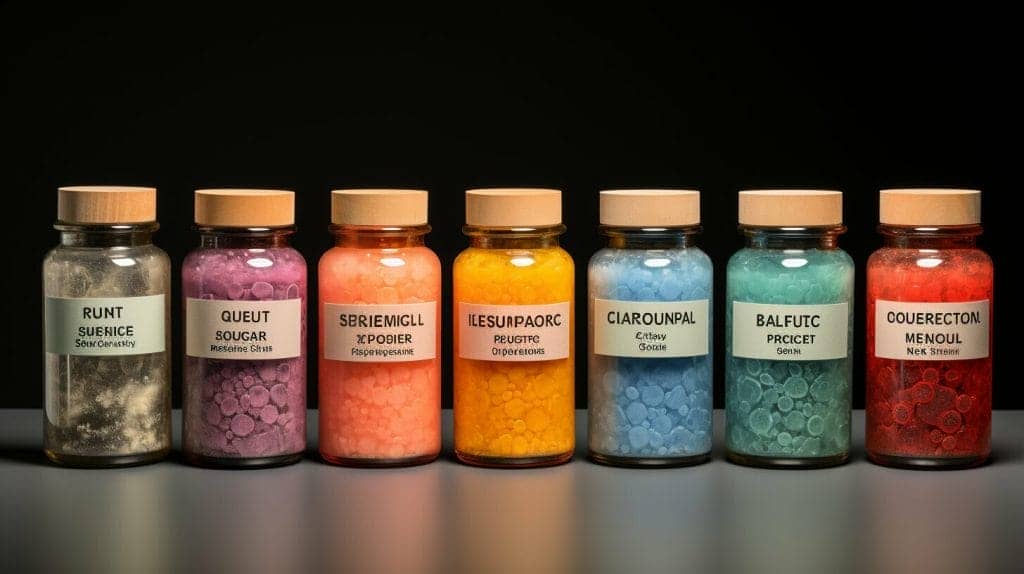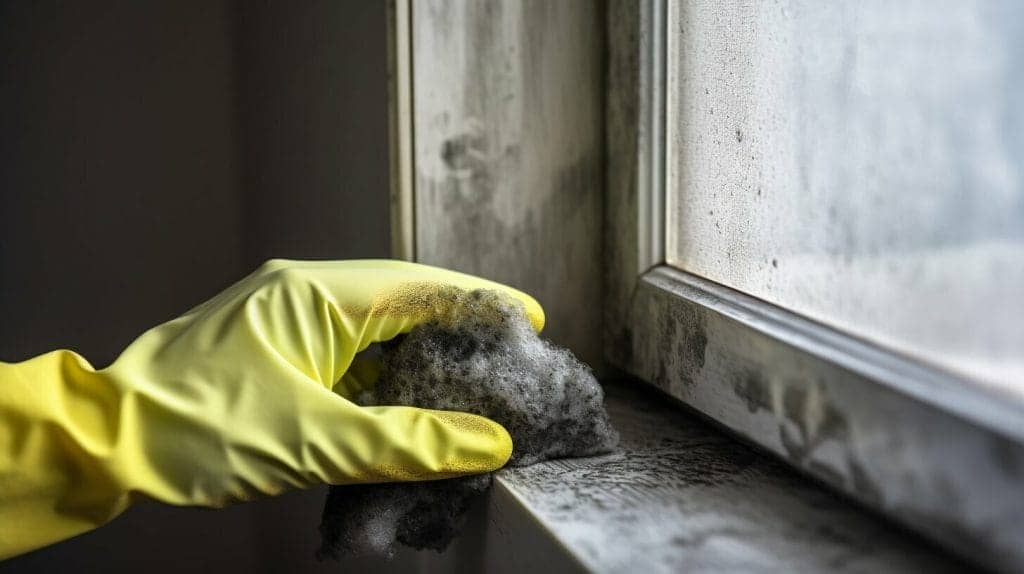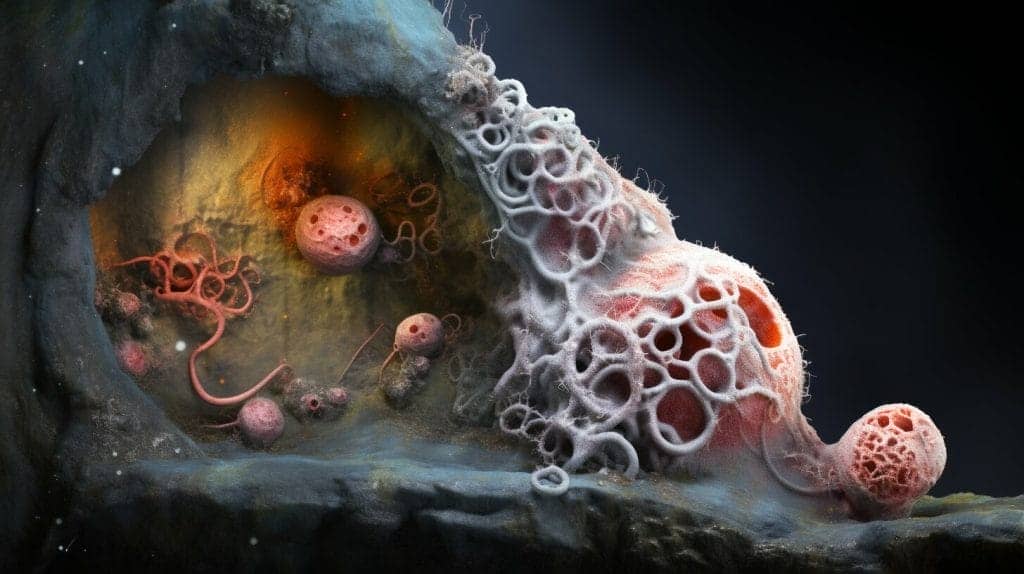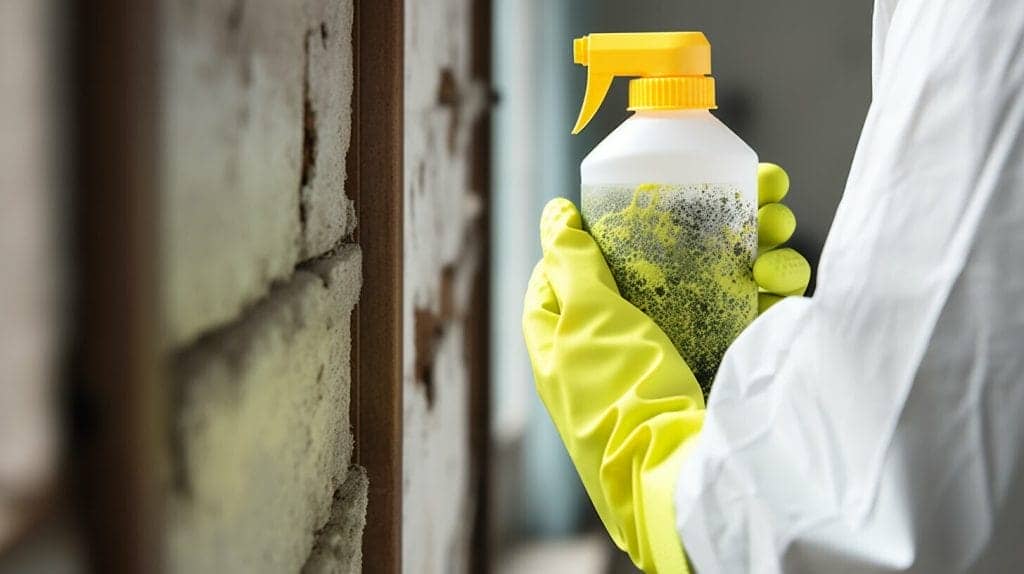Individuals suffering from mold-induced infections require effective treatments to alleviate their symptoms and improve their overall health. Prescription antifungals are commonly used to combat fungal infections caused by mold exposure. These medications work by eliminating the fungi and preventing them from spreading further.
It is crucial to find the right prescription antifungal for mold-induced infections, as not all medications are equally effective. Consulting with a healthcare professional is vital to determine the most suitable treatment plan for each patient.
Key Takeaways:
- Prescription antifungals are used to treat mold-induced infections.
- Effective medications are vital for improving the patient’s overall health.
- Consulting with a healthcare professional is crucial to determine the best treatment plan.
Understanding Mold-Induced Infections
Mold-induced infections occur when individuals are exposed to mold spores and develop an allergic reaction or infection as a result. These infections can affect the skin, respiratory system, and digestive tract, and can lead to a range of health problems.
Common symptoms of mold-induced infections include coughing, wheezing, skin rashes, and digestive issues. In severe cases, mold exposure can lead to chronic health conditions, such as asthma and other respiratory illnesses.
It is important to seek proper treatment for mold-induced infections to prevent further complications. Treatment options may include prescription remedies, holistic approaches, or a combination of both.
Consulting with a healthcare professional is essential to determine the best course of action for treating mold-related illnesses. With the right treatment, individuals can regain their health and reduce their risk of future complications.
Prescription Antifungals: An Overview
Prescription antifungals are medications used to treat fungal infections caused by mold. These drugs work by targeting the cell walls or membranes of fungi, effectively destroying them and stopping their growth. Prescription antifungals can be highly effective in treating mold-induced infections, particularly when used in combination with other forms of treatment.
There are several types of prescription antifungals commonly used to treat mold-related infections. These include:
| Type | Examples |
|---|---|
| Azoles | Fluconazole, Itraconazole, Voriconazole |
| Polyenes | Amphotericin B, Nystatin |
| Echinocandins | Caspofungin, Micafungin, Anidulafungin |
Azoles are the most commonly used prescription antifungal for mold-induced infections. They work by inhibiting the production of a fungal cell wall component called ergosterol, which weakens and destroys the fungal cell.
Polyenes, on the other hand, bind to and break down the cell membrane of the fungi, causing them to rupture and die. Echinocandins target a different component of the fungal cell wall, disrupting its synthesis and ultimately leading to cell death.
It is important to note that while prescription antifungals can be effective in treating mold-induced infections, they may come with side effects such as nausea, headaches, and liver damage. Your doctor will work with you to determine the best course of treatment and monitor any potential side effects.
Common Prescription Antifungals for Mold-Induced Infections
Prescription antifungal medications are the primary treatment option for individuals suffering from mold-induced fungal infections. The best course of treatment typically depends on the severity of the infection, as well as the patient’s overall health and medical history. Here are some of the most commonly prescribed antifungal medications used to treat mold-related illnesses:
| Antifungal Medication | Brand Name | Common Side Effects |
|---|---|---|
| Fluconazole | Diflucan | Nausea, headache, diarrhea |
| Itraconazole | Sporanox | Nausea, vomiting, diarrhea |
| Amphotericin B | Fungizone | Fever, chills, fatigue |
Fluconazole and Itraconazole are typically prescribed for mild to moderate mold infections, while Amphotericin B is reserved for more severe cases that have not responded to other treatments. While these medications can effectively combat fungal infections, they can also cause a range of side effects. It is important for patients to discuss potential side effects with their healthcare provider and report any adverse reactions immediately.
It is also worth noting that certain strains of mold may be resistant to certain antifungal medications. In these cases, the healthcare provider may need to adjust the treatment plan or consider alternative medications.
Proper Usage and Safety of Prescription Antifungals
When treating mold-induced infections with prescription antifungals, it is important to follow the prescribed dosage and duration of treatment. Failure to do so may result in medication resistance and recurrent infections. It is also essential to inform the prescribing healthcare provider of any existing medical conditions, allergies, or medications being taken to avoid potential drug interactions.
Pregnant women, individuals with liver or kidney problems, and those with weakened immune systems require special consideration when using prescription antifungals. It is recommended that they consult their healthcare provider before taking any medication for mold-induced fungal infections.
Safety should also be a top priority when using these medications. Adverse reactions such as allergic reactions, liver toxicity, and cardiac arrhythmias can occur. Close monitoring by a healthcare provider is necessary to prevent and manage any potential side effects.
Proper usage and safety of prescription antifungals can help ensure successful treatment outcomes and improve overall health. Seeking guidance from a healthcare provider and following their instructions is essential.
Benefits of Prescription Antifungals for Mold-Induced Infections
Prescription antifungals are highly effective medications for mold-induced fungal infections, offering relief for individuals suffering from such conditions. As with any medication, prescription antifungals can have side effects, but their benefits often outweigh any risks.
Prescribed antifungal drugs can effectively combat mold-related illnesses, reducing symptoms such as coughing, wheezing, and skin irritation. They work by inhibiting fungal growth and destroying existing fungal cells, ultimately alleviating the infection and its associated symptoms.
Many prescription antifungals are available on the market, so selecting the appropriate medication for your specific condition can require the skilled guidance of a medical professional. Your doctor may recommend a systemic medication, which travels through your bloodstream to various body parts, or a topical medication, which is applied directly to the affected area.
Overall, prescription antifungals for mold-induced infections offer a reliable and effective treatment option for those in need of immediate relief. However, it is important to always consult with a medical professional before beginning any medication regimen to ensure that it is safe and appropriate for your situation.
Holistic Approaches at Oasis Medical Institute
For those seeking alternatives to prescription antifungals, Oasis Medical Institute in Tijuana, MX offers a holistic Mold Toxicity treatment program. Their expert staff, led by Dr. Francisco Contreras MD, combines traditional medicine with complementary therapies to address Mold Toxicity.
The program includes a comprehensive evaluation to identify specific triggers and a personalized treatment plan, which may include detoxification programs, immune support, and nutritional therapy. The focus is on improving overall wellness and addressing the root cause of the mold-induced infection, rather than just treating symptoms.
At Oasis Medical Institute, patients have access to cutting-edge technology and integrative medicine, including ozone therapy, hyperthermia, and acupuncture. The staff is committed to providing compassionate care and empowering patients to take control of their health.
With their holistic approach, Oasis Medical Institute offers a unique and effective way to address mold-induced infections. Contact them today to learn more about their holistic treatments at Oasis Medical Institute in Tijuana, MX and schedule a consultation with Dr. Francisco Contreras MD.
Integrative Medicine for Mold Toxicity
At Oasis Medical Institute, Dr. Francisco Contreras MD takes an integrative approach to treating Mold Toxicity. This involves combining traditional medicine with complementary therapies to provide patients with a comprehensive treatment plan.
Dr. Contreras MD recognizes that mold-induced infections not only affect the physical body but also impact the emotional and mental well-being of patients. Therefore, his approach to treatment addresses all aspects of health and includes mind-body practices such as meditation, yoga, and art therapy to support the healing process.
Along with these complementary therapies, Dr. Contreras MD utilizes prescription antifungals to combat mold-related illnesses. He also incorporates natural supplements and dietary changes to boost the immune system and support the body’s detoxification process.
At Oasis Medical Institute, patients can expect a personalized treatment plan that addresses their specific needs and health goals. Dr. Contreras MD works closely with each patient to ensure they receive the best care possible.
If you are struggling with mold-induced infections, consider booking a consultation with Dr. Francisco Contreras MD at Oasis Medical Institute to explore holistic treatment options.
Call 866-868-1992 to schedule an appointment today.
Consulting with Dr. Francisco Contreras MD
If you or a loved one is suffering from a mold-induced infection, it is important to seek proper treatment to prevent further health complications. At Oasis Medical Institute in Tijuana, MX, Dr. Francisco Contreras MD offers a holistic Mold Toxicity treatment program that combines traditional medicine with complementary therapies to address the root cause of the problem.
To learn more about this integrative approach, readers are encouraged to book a consultation with Dr. Francisco Contreras MD. During this appointment, patients can discuss their symptoms and explore holistic treatment options that address their unique needs. To book a consultation, call 866-868-1992 or fill out the online form on our website.
At Oasis Medical Institute, we believe in the power of integrative medicine to improve overall health and wellness. Contact us today to learn more about our holistic Mold Toxicity treatment program and schedule your consultation with Dr. Francisco Contreras MD.
CTA: Book your consultation with Dr. Francisco Contreras MD at Oasis Medical Institute today. Call 866-868-1992 to learn more about our holistic Mold Toxicity treatment program.
Conclusion
In conclusion, prescription antifungals are highly effective for treating mold-induced infections. It is important for individuals suffering from mold-related illnesses to seek proper treatment to prevent further complications. Understanding the various prescription antifungals available and their proper usage is critical to achieving optimal results.
While prescription antifungals can be highly beneficial, it is also important to consider holistic treatment options. Oasis Medical Institute, under the expertise of Dr. Francisco Contreras MD, offers an integrative approach to treating Mold Toxicity. The combination of traditional medicine and complementary therapies can be highly effective in addressing the underlying causes of mold-related illnesses.
If you are suffering from mold-induced infections, it is highly recommended to consult with Dr. Francisco Contreras MD at Oasis Medical Institute. Book a consultation today to explore the holistic treatment options available and take the first step towards achieving optimal health.
FAQ
Q: What are prescription antifungals?
A: Prescription antifungals are medications that are used to treat fungal infections in the body. They work by targeting and destroying the fungi causing the infection.
Q: How do prescription antifungals work?
A: Prescription antifungals work by disrupting the growth and reproduction of fungi, ultimately killing them or stopping their spread. They can be taken orally or applied topically, depending on the type of infection and the medication prescribed.
Q: What are the most common prescription antifungals for mold-induced infections?
A: The most commonly prescribed antifungal medications for mold-induced infections include fluconazole, itraconazole, and voriconazole. These medications are effective in treating various types of mold-related infections.
Q: What are the potential side effects of prescription antifungals?
A: Common side effects of prescription antifungals may include nausea, vomiting, diarrhea, stomach pain, headache, and rash. It is important to consult with a healthcare professional if experiencing any adverse reactions.
Q: How long should prescription antifungals be taken for mold-induced infections?
A: The duration of treatment with prescription antifungals for mold-induced infections can vary depending on the severity and type of infection. It is crucial to follow the prescribed dosage and finish the full course of treatment to ensure the infection is fully eradicated.
Dr. Francisco Contreras, MD is a renowned integrative medical physician with over 20 years of dedicated experience in the field of integrative medicine. As the Medical Director of the Oasis of Hope Hospital in Tijuana, Mexico, he has pioneered innovative treatments and integrative approaches that have been recognized globally for the treatment of cancer, Lyme Disease, Mold Toxicity, and chronic disease using alternative treatment modalities. Dr. Contreras holds a medical degree from the Autonomous University of Mexico in Toluca, and speciality in surgical oncology from the University of Vienna in Austria.
Under his visionary leadership, the Oasis of Hope Hospital has emerged as a leading institution, renowned for its innovative treatments and patient-centric approach for treating cancer, Lyme Disease, Mold Toxicity, Long-Haul COVID, and chronic disease. The hospital, under Dr. Contreras's guidance, has successfully treated thousands of patients, many of whom traveled from different parts of the world, seeking the unique and compassionate care the institution offers.
Dr. Contreras has contributed to numerous research papers, articles, and medical journals, solidifying his expertise in the realm of integrative medicine. His commitment to patient care and evidence-based treatments has earned him a reputation for trustworthiness and excellence. Dr. Contreras is frequently invited to speak at international conferences and has been featured on CNN, WMAR2 News, KGUN9 News, Tyent USA, and various others for his groundbreaking work. His dedication to the medical community and his patients is unwavering, making him a leading authority in the field.
Contreras has authored and co-authored several books concerning integrative therapy, cancer, Lyme Disease and heart disease prevention and chronic illness, including "The Art Science of Undermining Cancer", "The Art & Science of Undermining Cancer: Strategies to Slow, Control, Reverse", "Look Younger, Live Longer: 10 Steps to Reverse Aging and Live a Vibrant Life", "The Coming Cancer Cure Your Guide to effective alternative, conventional and integrative therapies", "Hope Medicine & Healing", "Health in the 21st Century: Will Doctors Survive?", "Healthy Heart: An alternative guide to a healthy heart", “The Hope of Living Cancer Free”, “Hope Of Living Long And Well: 10 Steps to look younger, feel better, live longer” “Fighting Cancer 20 Different Ways”, "50 Critical Cancer Answers: Your Personal Battle Plan for Beating Cancer", "To Beat . . . Or Not to Beat?", and “Dismantling Cancer.”






















